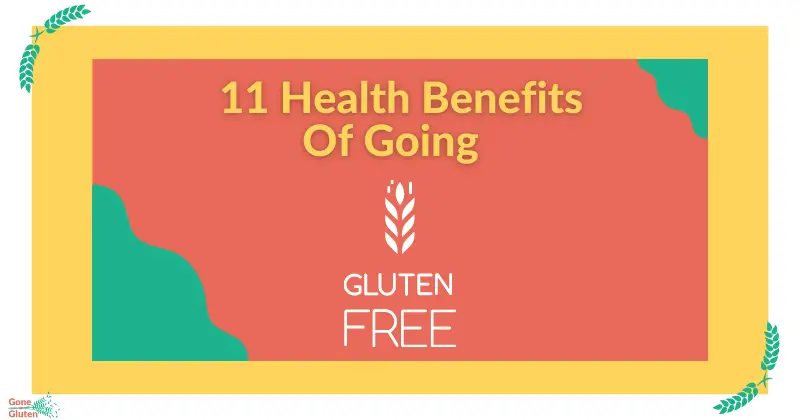Our gluten-free diet went from rare to everywhere. I’m sure you have heard some of the rumored health benefits of going gluten-free, so what exactly are they?
In 2018 I stopped eating gluten and started devouring information. I couldn’t believe the effects my diet was having on my health. I was suddenly relieved from numerous debilitating symptoms—and I wanted to stay that way.
This post will explore the many benefits of a GF diet and supply tips that can benefit anyone, even if you don’t have underlying intolerances.

Are Gluten-Free Products Healthier?
Before we dive into the list, let’s do a quick overview of gluten-free products. While on a gluten-free diet, people often think my baked goods or processed snacks are healthier than their original items.
People look at my bag of gluten-free pretzels and always seem to comment, “ooh, healthy” when I have gluten-free pretzels. This is a common misconception. They are not pretzels, gluten or not. They are often replaced with more refined sugar and carbohydrates making these products unhealthy.
A gluten-free diet is so much more than replacing bread and pasta with gluten-free versions. Let’s find out the 11 health benefits of the diet.
1. Prevent serious illness
Celiac disease and wheat allergies are two severe conditions that relate to gluten. Let’s take a closer look.
Celiac Disease (CD)

CD is a condition where the sufferer’s immune system identifies gluten as a significant threat. It attacks the gluten with such force that it causes damage to the lining of the gut. Not only is this extremely painful, but it can also lead to malnutrition.
The intestinal damage prevents the sufferer from absorbing nutrients from food, which can lead to anemia from lack of iron, weight loss, fertility problems, and many other complications.
Wheat allergy

A wheat allergy is an acute sensitivity to wheat that can lead to anaphylaxis. Even inhaling small amounts of wheat flour can cause throat swelling and breathing problems similar to an asthma attack.
Diagnosis
Around 2% of Americans suffer from either CD or wheat allergy. Sufferers have to give up gluten for the rest of their lives because even minor exposure can lead to symptoms that require hospital treatment. Your doctor can diagnose these conditions with a simple blood test, so book a test if you worry you may have them.
2. Improve your digestion

Irritable bowel syndrome (IBS) is a condition that causes difficulty and discomfort with digestion. Various factors can cause IBS and not just gluten. However, IBS sufferers frequently benefit from going GF since gluten is a common irritant.
Non-celiac gluten sensitivity (NCGS) is a subgroup of IBS and is an intolerance to gluten in people who don’t have CD. It doesn’t attack the gut, so it is less serious than CD, although symptoms can be similar.
While not as serious as CD or wheat allergy, IBS and NCGS are both much more prevalent and affect around 15-20% of the population. Symptoms are similar for both and can be very unpleasant, including:
- Bloating
- Indigestion
- Gassiness
- Tiredness and fatigue
- Difficulty concentrating
- Nausea
- Headaches
- Depression
If you suffer these symptoms after gluten-heavy meals, you may benefit from going GF. Gluten is resistant to the enzymes that break down proteins in your digestive tract, which is why it can cause inflammation and irritation.
3. Cut out processed food

Processed foods are enjoyable and convenient—in the short term. In the long term, they can lead to serious health problems. They are often full of chemicals and additives and have little nutritional value.
Many processed foods are now gluten-free, but they are not fat, salt, or sugar-free. Processed foods are like a friend who seems charming and fun at first, then turns toxic over time—and you become dependent as you try to chase the thrill of the first encounter. So avoid them when you can.
But if you’re reducing your intake of processed foods, what should you replace them with?
4. Eat more whole foods

A GFD is an opportunity to immerse yourself in the ritual of preparing and eating food. Why buy processed pasta sauce when it’s so easy and healthier to make your own? Start with fresh tomatoes and onions, add a dash of red wine and garnish with basil leaves. Make your kitchen smell like an Italian restaurant!
Don’t stop there—try an Indian curry with leafy greens and chickpeas. Or a chicken salad with fresh veggies, seeds, nuts, and homemade mango dressing. The world and all of its fresh produce are yours. Just not the ones that give you a bellyache!
5. Improve your tolerance to lactose and other foods

Gluten can cause inflammation and irritation to your gut that can increase sensitivity to other foods such as:
- Lactose
- Eggs
- Seafood
- High FODMAPs foods
- Caffeine
- Alcohol
Many people with gluten intolerance sometimes assume they also have other intolerances, for example, lactose. This might be because they suffer from bloating and gassiness after drinking milk. Lactose is a common irritant, so this is a logical conclusion to draw.
The fact is, if you’re gluten intolerant, then you may already be suffering from inflammation from eating gluten. Then when you drink milk, your gut is sensitive and struggles to cope with lactose. Once you’re gluten-free, you may have no problem digesting lactose and other intolerance-related foods.
Elimination Diets
For a permanent solution to your symptoms, why not try an elimination diet? This involves cutting out all foods that can cause irritation. Once your symptoms subside, you can reintroduce different food types back into your diet, one-by-one. Cutting out gluten can help you enjoy all the other foods that you love.
6. Reduce bloating and inflammation

Prior to my diagnosis of gluten intolerance, I was taking drastic measures to manage my symptoms of bloating and constipation.
I increased my fiber intake, started taking medicine, cut out unhealthy foods, and changed my exercise routine. Things would be ok for a little while and then boom, the discomfort would swoop back in,
Gross-out alert: When you have an intolerance, your body has difficulty digesting certain foods. Those undigested foods stick around in your lower intestine, where they start to rot.
This is what causes the gas and inflammation that leads to bloating. This makes digestion difficult and can result in diarrhea and/or constipation.
Once I cut out gluten, I was able to return to the regular, healthy diet and happier lifestyle that I enjoy to this day!
7. Improve sleep and increase energy levels

It’s hardly surprising that all this cramp and discomfort can disturb your sleep. When your belly is gurgling and slurping like rain boots through a swamp, it’s hard enough to relax—let alone drift off to sleep. If painful indigestion and frequent toilet visits are keeping you up at night, it might be time to give gluten the boot.
The lack of sleep along with physical and mental agitation all mean your concentration suffers too. Your mood dips, you feel lethargic, your energy levels drop, and you feel sluggish the whole time.
Cut all this out by cutting out your allergies. When your symptoms subside, you can give 100% mentally and physically again, and you can relax, sleep, and fully recharge at the end of the day.
8. Improve your complexion

Skin is the body’s largest organ. Just like other organs, it relies on your gut for nutrition. If your gut has inflammation, it can prevent proper absorption of the nourishment your skin needs. This can cause and/or inflame numerous conditions such as:
- Acne
- Eczema
- Psoriasis
- Rosacea
- Hives
I had horrible acne that was constantly painful and left me feeling self-conscious. Then I went GF, and other symptoms like my chronic headaches subsided.
I was so relieved that I hardly noticed that my acne was clearing up too. I was so used to living with it. It’s crazy to think how many problems can stem from an unhappy gut.
A vlogger reports the positive effects of a GF diet on her acne and the benefits of keeping an allergy diary.
9. Relieve psychological issues
There are inextricable links between the mind and the body. Stress and anxiety can cause digestion problems, and digestion problems can cause stress and anxiety. It’s a horrible vicious cycle that needs to be broken.
Going GF can relieve physical irritation and inflammation, which in turn relieves psychological issues such as:
- Anxiety
- Depression
- Fatigue
- Paranoia
- Confusion
- Headaches and migraines
- Insomnia
10. Achieve consistent, healthy body weight

A lack of mental and physical energy can make it difficult to exercise. Tiredness and depression can make us dependent on a diet of junk food. This can lead to weight gain, not to mention other serious long-term health issues.
Conversely, gut inflammation can lead to a lack of appetite. We are unable to gain much nourishment from what little food we do eat. This can lead to malnourishment and appearing frail and underweight.
Gluten intolerance can make it difficult to achieve healthy body weight. Going GF can help you maintain a healthy, regular weight.
11. Improve other health conditions

Gluten can cause issues for people with autoimmune deficiencies. These include:
- Type 1 diabetes
- Grave’s disease
- Rheumatoid arthritis
- Thyroiditis
- Liver disease
These conditions share common genes with CD, so sufferers can experience similar symptoms. In fact, if you have an autoimmune disease, you are significantly more likely to also have CD.
Other conditions that can benefit from a GFD include:
- Crohn’s disease
- Ulcerative colitis
- Schizophrenia
- Osteoporosis
- Fibromyalgia
- MS
- Epilepsy
- Endometriosis
Final thoughts
If you’re sensitive to gluten, then the consequences can snowball. It might start in your gut, but the knock-on effects can harm your body, mind, and overall wellbeing.
By now, you should have a good idea about the problems gluten can cause and the freedom that GF can offer. But we’ve got way more dietary advice for you! Check out Does Organic Mean Gluten-Free? Find Out The Difference



